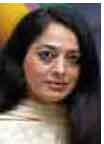| Spiritual Meditations | |
| 19 Jan 2011, NewAgeIslam.Com |
| Sufi’s light on divinity | ||
| ||
| Sufi’s light on divinity | |
By Sadia Dehlvi January 17th, 2011 The mystic and philosopher Shaykh Muhyiddin Ibn al Arabi is amongst my favourite early Sufis. Born in Murcia, Moorish Spain in 1165, he came to be called Shaykh ul Akbar, the great master. One of the most prolific writers in Islamic history, Ibn al Arabi’s writings immensely impacted Muslim communities throughout the world. He remains a refreshing voice that throws light on the human condition in any time and any place. Rooted in Islamic sciences, his work is universal, accepting that each person has a unique path to the Truth. The 19-year-old Ibn al Arabi met the renowned philosopher Ibn Rushd (d. 1198) whom the West knows as Averroes. The philosopher asked the young mystic, “Do the fruits of mystic illumination agree with philosophical speculation?” Ibn al Arabi replied, “Yes and no. Between the yes and no, the spirits take their flight beyond the matter”. Impressed with the answer Ibn Rushd exclaimed, “Glory to Allah. I have lived at a time when there exists a master of this experience, one of those who opens the locks of His doors”. Fourteen years later when Ibn Rushd died, Ibn al Arabi attended the funeral and referred to him as a great leader. Born in the town of Muricia in Spain, Ibn al Arabi moved to Seville where he studied religious sciences. Since his father was a devotee of the renowned Sufi scholar Shaykh Abdul Qadir Jilani of Baghdad, Ibn al Arabi grew up in Sufi circles. The Master attributed his education to two women, one of them being the mystic Fatima of Cordova. The Shaykh spent many years in Andalusia and North Africa. Ibn al Arabi finally settled in Damascus where he taught and wrote till his death. A prolific writer, he authored numerous books on Sufi philosophy asserting that perfect knowledge of God needed both the eye of reason and the eye of imagination. Ibn al Arabi’s philosophy and articulation of wahdat ul wujood, Oneness of Being, remains the most celebrated and controversial idea throughout the Muslim world influencing Sufi philosophy forever. Ibn al Arabi explained, “It is He who is revealed in every face, sought in every sign, gazed upon by every eye, worshipped in every object of worship, and pursued in the unseen and the visible. Ibn al Arabi died in 1240, remembered for his contribution in understanding Divine Love in prose and verse: Wonder, A garden among flames! My heart has become capable of every form: A pasture for gazelles and a convent for Christian monks, And a temple for idols, and the pilgrim’s Kaaba, The tables of the Torah and the book of the Koran. I believe in the religion of Love Whatever direction its caravans may take, For love is my religion and my faith. Sadia Dehlvi is a Delhi-based writer and author of Sufism: The Heart of Islam. She can be contacted at sadiafeedback@gmail.com Source: Asian Age URL: http://www.newageislam.com/NewAgeIslamIslamSpiritualMeditations_1.aspx?ArticleID=3959 |





 Moderate Islamist here
Moderate Islamist here


0 comments:
Post a Comment